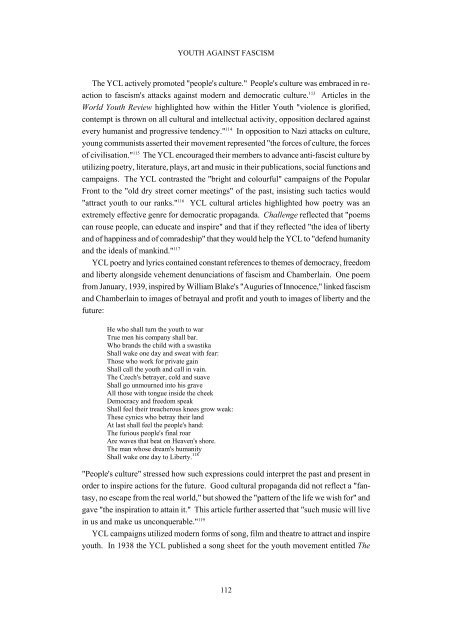Joel A Lewis Youth Against Fascism.pdf
Joel A Lewis Youth Against Fascism.pdf
Joel A Lewis Youth Against Fascism.pdf
You also want an ePaper? Increase the reach of your titles
YUMPU automatically turns print PDFs into web optimized ePapers that Google loves.
YOUTH AGAINST FASCISM<br />
The YCL actively promoted "people's culture." People's culture was embraced in reaction<br />
to fascism's attacks against modern and democratic culture. 113 Articles in the<br />
World <strong>Youth</strong> Review highlighted how within the Hitler <strong>Youth</strong> "violence is glorified,<br />
contempt is thrown on all cultural and intellectual activity, opposition declared against<br />
every humanist and progressive tendency." 114 In opposition to Nazi attacks on culture,<br />
young communists asserted their movement represented "the forces of culture, the forces<br />
of civilisation." 115 The YCL encouraged their members to advance anti-fascist culture by<br />
utilizing poetry, literature, plays, art and music in their publications, social functions and<br />
campaigns. The YCL contrasted the "bright and colourful" campaigns of the Popular<br />
Front to the "old dry street corner meetings" of the past, insisting such tactics would<br />
"attract youth to our ranks." 116 YCL cultural articles highlighted how poetry was an<br />
extremely effective genre for democratic propaganda. Challenge reflected that "poems<br />
can rouse people, can educate and inspire" and that if they reflected "the idea of liberty<br />
and of happiness and of comradeship" that they would help the YCL to "defend humanity<br />
and the ideals of mankind." 117<br />
YCL poetry and lyrics contained constant references to themes of democracy, freedom<br />
and liberty alongside vehement denunciations of fascism and Chamberlain. One poem<br />
from January, 1939, inspired by William Blake's "Auguries of Innocence," linked fascism<br />
and Chamberlain to images of betrayal and profit and youth to images of liberty and the<br />
future:<br />
He who shall turn the youth to war<br />
True men his company shall bar.<br />
Who brands the child with a swastika<br />
Shall wake one day and sweat with fear:<br />
Those who work for private gain<br />
Shall call the youth and call in vain.<br />
The Czech's betrayer, cold and suave<br />
Shall go unmourned into his grave<br />
All those with tongue inside the cheek<br />
Democracy and freedom speak<br />
Shall feel their treacherous knees grow weak:<br />
These cynics who betray their land<br />
At last shall feel the people's hand:<br />
The furious people's final roar<br />
Are waves that beat on Heaven's shore.<br />
The man whose dream's humanity<br />
Shall wake one day to Liberty. 118<br />
"People's culture" stressed how such expressions could interpret the past and present in<br />
order to inspire actions for the future. Good cultural propaganda did not reflect a "fantasy,<br />
no escape from the real world," but showed the "pattern of the life we wish for" and<br />
gave "the inspiration to attain it." This article further asserted that "such music will live<br />
in us and make us unconquerable." 119<br />
YCL campaigns utilized modern forms of song, film and theatre to attract and inspire<br />
youth. In 1938 the YCL published a song sheet for the youth movement entitled The<br />
112

















